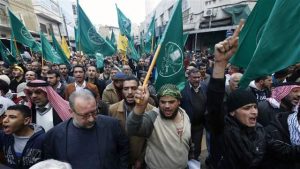 The parliamentary election partial results released by the Jordanian electoral committee have shown that the Muslim Brotherhood is returning to the parliament as a significant opposition force, after it boycotted elections since 2007.
The parliamentary election partial results released by the Jordanian electoral committee have shown that the Muslim Brotherhood is returning to the parliament as a significant opposition force, after it boycotted elections since 2007.
The movement’s political arm, the Islamic Action Front party, won 13 of 130 seats, according to preliminary results.
The party has been boycotting the elections since 2007 to protest the electoral system that favors, it claims, tribal and other pro-government candidates.
Zaki Bani Rsheid, the Brotherhood’s second in command, explained that the party decided to participate in the polls after the amendments introduced on the electoral law (in March) and also to respond to the Jordanian people’s wish to see the party’s participation.
The Islamic Action Front’s return to the elections was marked by flexibility. The ‘Islam is the Solution’ slogan was dropped to include Christians and prominent national figures to campaign for parliamentary seats under the newly created National Coalition for Reform (NCR.)
The brotherhood’s party is the most organized in the country. It wants to be an effective opposition in parliament by forming alliances with other parties. Rsheid argued that “the vast majority (of lawmakers) will be made up as usual of deputies already close to power” and “the presence of other parties will be very weak.”
King Abdullah hailed Tuesday’s elections as a “real victory” saying that it was challenging given “the unrest in the region and the burden of refugees.” The king will appoint the government as the kingdom has no ruling party. He also reserves the right to sack members of parliament.
Observers said the election was held in a “largely peaceful atmosphere” but European Union’s chief observer, Jo Leinen, underlined that “there is no equality of the vote. Under the current districting, large urban areas are under-represented, while sparsely populated or rural areas are considerably over-represented.”
Only 37% of the 4.1million eligible voters participated in the elections and analysts claim participation could have been lower if the Muslim Brotherhood continued its boycott of the polls. The low turnout was also linked to the lack of enthusiasm of voters as the parliament is usually dominated by pro-government tribal leaders, businessmen and ex-security officials, and has limited power to affect government policy.
